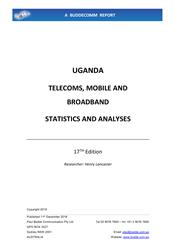2018 Uganda - Telecoms, Mobile and Broadband - Statistics and Analyses

Last updated: 11 Dec 2018 Update History
Report Status: Archived
Report Pages: 61
Analyst: Henry Lancaster
Publication Overview
This report provides a comprehensive overview of trends and developments in Uganda’s telecommunications market. The report analyses the fixed-line, mobile and broadband sectors. Subjects include:
- Market and industry analyses, trends and developments;
- Facts, figures and statistics;
- Industry and regulatory issues;
- Infrastructure developments;
- Major Players, Revenues, Subscribers, ARPU, MoU;
- Mobile Voice and Data Markets;
- Broadband (FttP, DSL, cable, wireless);
- Mobile subscribers and ARPU;
- Broadband market forecasts;
- Government policies affecting the telecoms industry;
- Market liberalisation and industry issues;
- Telecoms operators – privatisation, IPOs, acquisitions, new licences;
- Mobile technologies (GSM; 3G, HSPA, LTE, 5G).
Researcher:- Henry Lancaster
Current publication date:- December 2018 (17th Edition)
Executive Summary
Ugandan government sells majority stake in Uganda Telecom
Reforms within the telecom sector in Uganda have provided the country with one of the most competitive markets in the region. The entry of MTN Uganda as the second national operator to compete with Uganda Telecom in all telecom sectors revolutionised the availability and quality of services. The incumbent telco in recent years has fallen victim to corruption and mismanagement, with the result that it failed to provide the services which customers wanted and was unable to compete effectively. The main shareholder LAP Green also consistently failed to make the necessary investments in networks and infrastructure. Uganda Telecom went into receivership in early 2017, and the government reasserted control of the company. In late 2018 a majority share in the operator was sold to Teleology Holdings.
A simplified and converged licensing regime has significantly reduced barriers to market entry, increased competition, and helped to reduce service costs for consumers. New licence obligations enforced in late 2018 will also ensure national internet coverage during 2019.
Uganda’s mobile market has long been overcrowded, which has encouraged some market consolidation over the years (including the sale of Orange Uganda to Africell Holding in mid-2014). It has also resulted in some casualties (including K2 Telecom and Vodafone Uganda, which both struggled to compete).
Key developments:
- National Broadband Infrastructure project leading to dramatic reduction in broadband access cost;
- Government sells majority stake in Uganda Telecom to Teleology Holdings;
- SIM card registration leads to large drop in subscriber numbers;
- Vodafone Uganda files for bankruptcy protection;
- Ericsson deploys its Converged Wallet platform for MTN Uganda;
- Google considers Project Look for Uganda;
- Government commissions broadband satellite services for remote areas;
- Regulator enforces national mobile broadband coverage obligations on mobile service licensees
- Report update includes the regulator’s market data to June 2018, operator data to Q3 2018, recent market developments.
Companies mentioned in this report:
MTN Uganda (Telia), Bharti Airtel (Zain, Celtel), Uganda Telecom (UTL, LAP Green, Telecel, Orascom, Deutsche Telekom), Warid Telecom (Essar), Orange Uganda (HiTS Telecom), i-Tel, Simba Telecoms, Monitise, American Tower Corporation (ATC), Eaton Towers, Smart Telecom, Sure Telecom, K2 Telecom, Africell (Lintel), UTL Online, Africa Online, Spacenet, Wateen Telecoms, Smile Telecom, Foris Telecom, Talk Telecom, Mo Telecom, Goal Technology Solutions (GTS), UMEME, MultiChoice, SEACOM, Infocom (Altech, Liquid Telecom), Internet Solutions
Related Reports
- Africa - Fixed Broadband Market - Statistics and Analyses
- Uganda - Telecoms, Mobile and Broadband - Statistics and Analyses
- 2019 Africa - Mobile Network Operators and MVNOs
- Ethiopia - Telecoms, Mobile and Broadband - Statistics and Analyses
- Morocco - Telecoms, Mobile and Broadband - Statistics and Analyses
- Namibia - Telecoms, Mobile and Broadband - Statistics and Analyses
- Madagascar - Telecoms, Mobile and Broadband - Statistics and Analyses
- Benin - Telecoms, Mobile and Broadband - Statistics and Analyses
- Cameroon - Telecoms, Mobile and Broadband - Statistics and Analyses
- Eritrea - Telecoms, Mobile and Broadband - Statistics and Analyses
Share this Report
TMT Intelligence
A platform to scale your intelligence tasks
Monitor critical insights with our AI-powered Market Intelligence Platform gathering and analyzing intelligence in real time. With AI trained to spot emerging trends and detect new strategic opportunities, our clients use TMT Intelligence to accelerate their growth.
If you want to know more about it, please see:
Research Methodology
BuddeComm's strategic business reports contain a combination of both primary and secondary research statistics, analyses written by our senior analysts supported by a network of experts, industry contacts and researchers from around the world as well as our own scenario forecasts.
For more details, please see:
More than 4,000 customers from 140 countries utilise BuddeComm Research
Are you interested in BuddeComm's Custom Research Service?
Hot Topics
News & Views
Have the latest telecommunications industry news delivered to your inbox by subscribing to BuddeComm's weekly newsletter.